“This is a guy who worked for Frank Zappa. Frank said to him, ‘Whatever you do, don’t learn how to read music.’ He's all-creative – he's a miracle, really”: Steve Vai on BEAT, being a virtuoso in his 60s – and the Fripp riff he just couldn’t master
The virtuoso reflects on how Frank Zappa helped him and Adrian Belew, the value of learning from rather than competing with other players and changing rig for his tour with Joe Satriani. But who’s going to be in the SatchVai band?
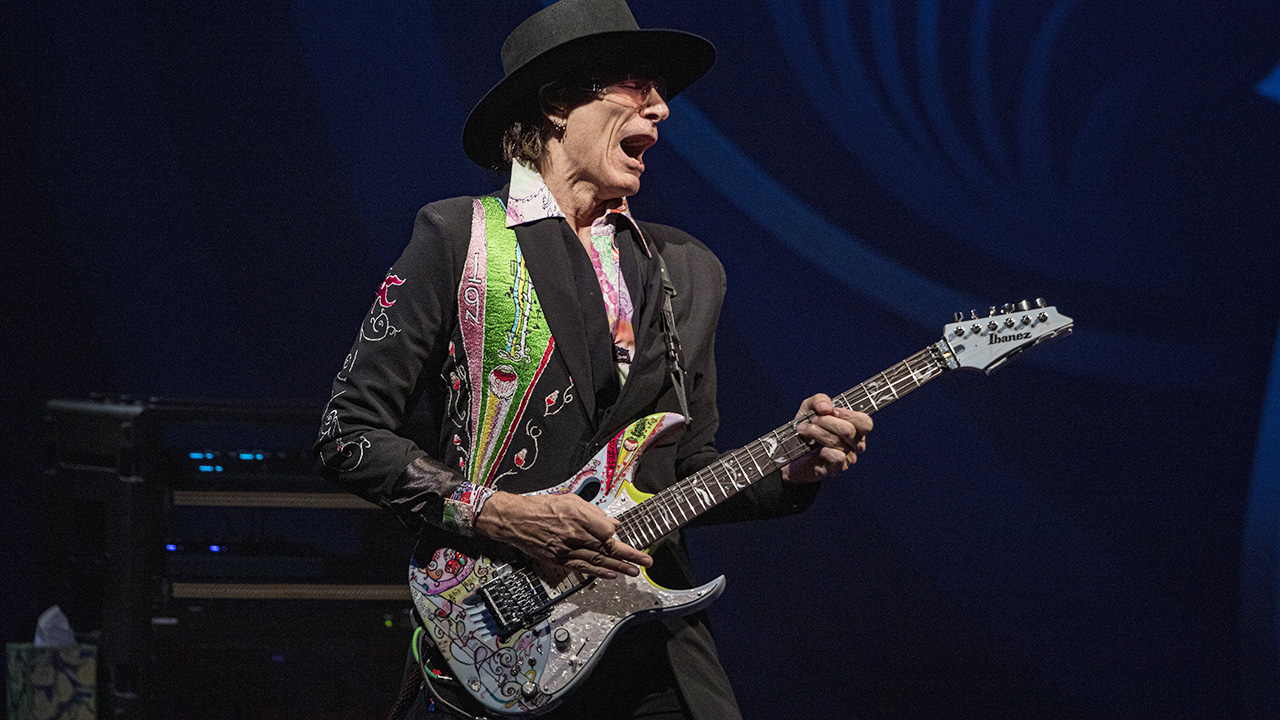
After kicking off 2024 beside old G3 pals Eric Johnson and Joe Satriani, Steve Vai hopped on tour with Satch for the aptly titled SatchVai tour. Then, alhough he's avoided supergroups for most of his career, he joined Adrian Belew, Tony Levin, and Danny Carey in BEAT to celebrate King Crimson’s well-loved guitar-synthy '80s era.
He knew of Belew, and shared Zappa-related lineage with him, but they’d never worked together. “I watch him every night,” Vai tells Guitar World. “Nobody is like anybody else – but there’s nobody even in the same playground as Adrian.”
BEAT wrapped its tour in late December, and more dates will follow. The obvious question is whether new music will follow too. “It’s hard to say,” Vai reports. “Everybody’s got such busy schedules. We have to navigate my schedule and Danny's with Tool. But I think there’s potential for further music.”
How might it sound? “That’s a slippery slope! BEAT is associated with King Crimson, so anything new would have good bones. If something like that came together, it would have to be as timeless as the music we’re playing now.”
Now 12 solo records deep, his next studio project is another collaboration – he’s finally recording with old pal Satriani, with plans to go back on the road this year.
“It’s always been my goal to create a catalog of undiluted music, so I’ve always worked alone – I just prefer that,” Vai says.
“But maybe it’s because I never hooked up with a person who is creative in the ways that I navigate. With Joe, it’s like a new chapter or a new awakening. It’s very important to play with other creative people. Regardless of their style or approach, you have to have an open mind.
Get The Pick Newsletter
All the latest guitar news, interviews, lessons, reviews, deals and more, direct to your inbox!
“It offers an opportunity to be educated, and to up your game. I’m not going to start playing like Adrian, obviously, but it’s interesting to bear witness to somebody else’s completely different approach to the instrument. It's inspirational.”
He continues: “One thing I highly recommend is to play with as many different players as possible. Instead of competing with them, learn from them – learn how what they’re doing can translate into your language. That can be very useful.”
You’ve had a busy year with G3, Sat/Vai and BEAT. What’s the secret to staving off fatigue?
“The shows keep you real. They raise your bar. It’s a whole different experience when you’re sitting at home, practicing, writing or recording. When you’re on stage, performing music for people, you develop different brain and finger muscles. I knew BEAT would take me out of my comfort zone and put me into a challenging guitar situation.
With my age and certain physical things, when things change, you just adjust
“I felt it was within my purview; that I’d be able to do it. You choose a gig that has music you adore, but is totally outside of your playground. What I’ve noticed after 40 years is it’s like being an elite athlete; there are periods of time when you’re in your prime, and there are times when you start to adjust.
“With my age and certain physical things – like any other virtuosic musician – when things change, you just adjust. You gain other tools that are as vitally important as when you were at your peak performance.”
On the surface, you don’t sound all that different than you did 40 years ago.
“In the beginning, of course, I was fascinated with technique, and playing fast and very challenging things. As my solo recordings evolved, I found myself responding more to melody. Maybe melody is the main reason I’ve been able to gather a fanbase.
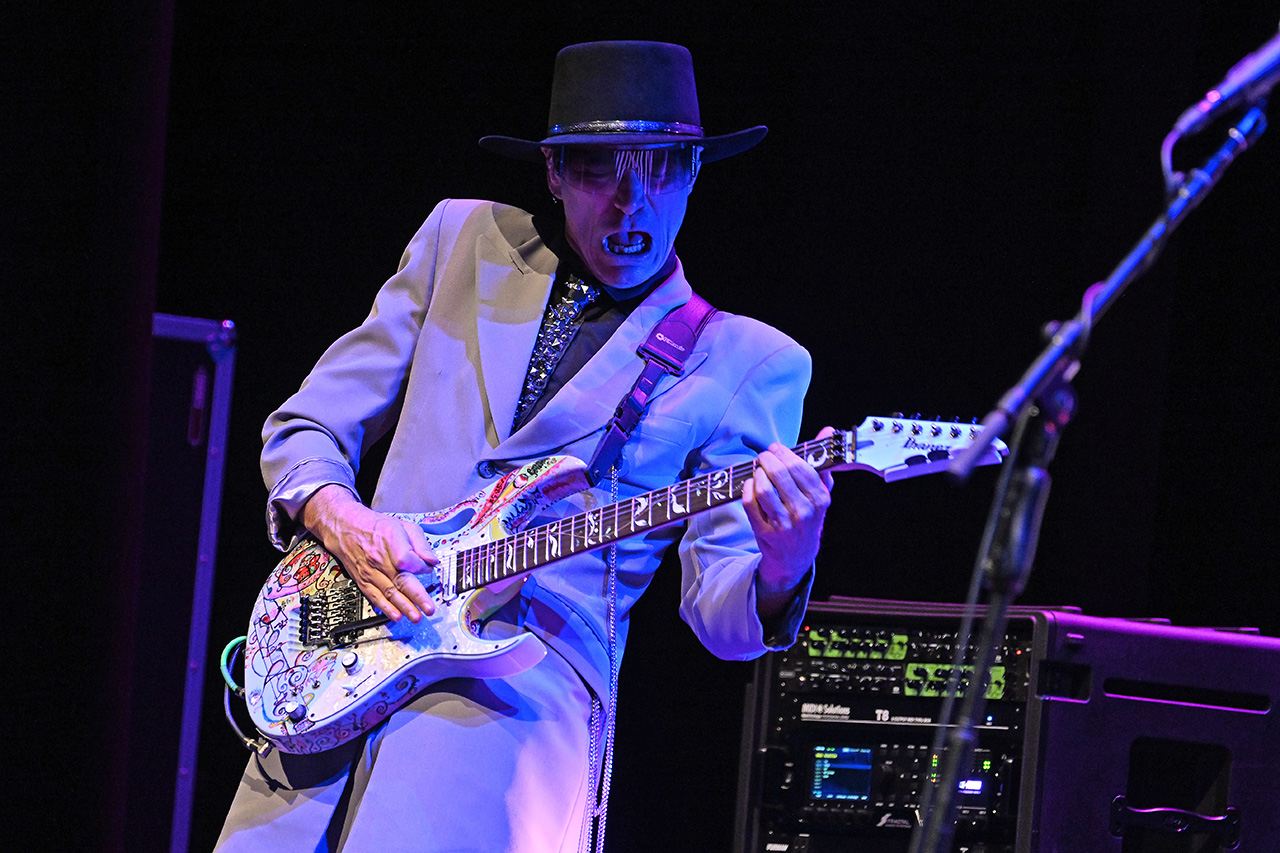
“I don't believe it’s just the way I play; it's within the DNA of an artist when they’re creating to flow into what they do. If there’s quality, authenticity and honesty in that DNA, it finds the right audience for it.
“I’ve been fortunate because my particular killer musical instincts have been embraced by a small yet loyal audience. And there’s people who are just interested in the guitar playing.”
What’s the most notable change as you adjust to getting older?
“As my playing has evolved, for me, phrasing is of the greatest value. It’s the voice of a melody, the voice of the solo – it’s the heart and soul of the connection with the notes. It’s how you make it speak and make your melody connect with the listener.
“I instinctually understood that at a younger age, but I was way too fascinated with intensity, complexity and virtuosity. So there’s melody in there, but phasing has been a focal development at this point.”
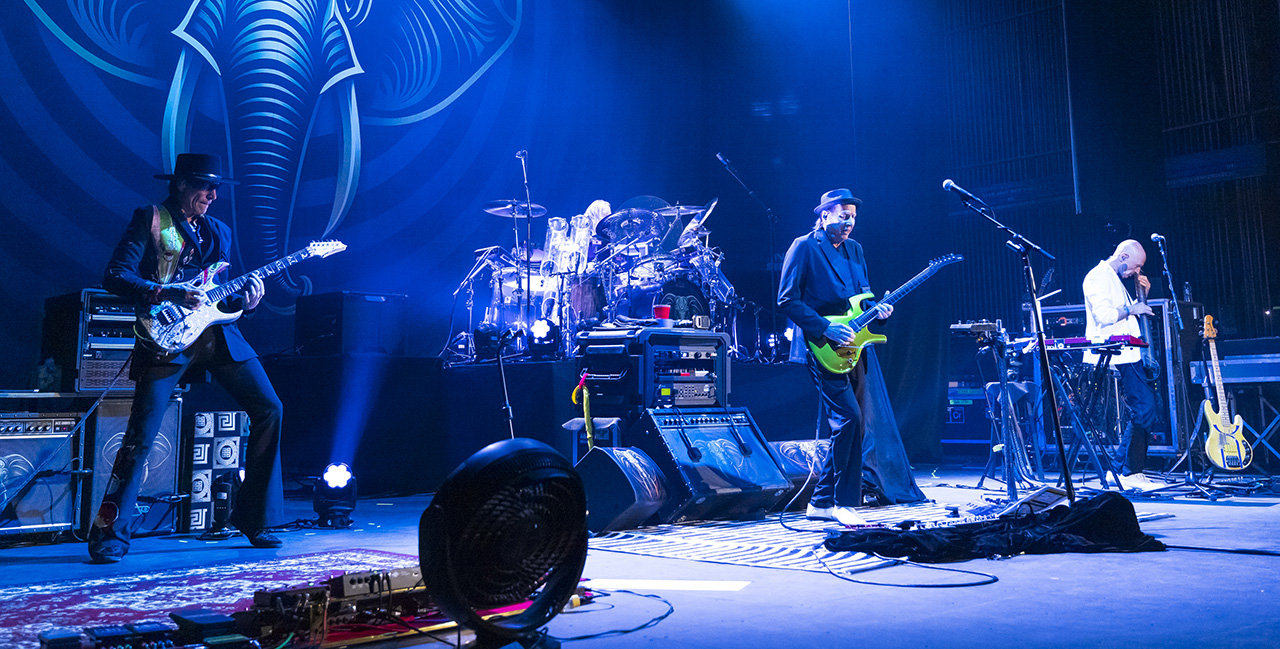
You’ve avoided joining supergroups in the past. What made BEAT different?
“It started about five years ago, before the pandemic, when Adrian called me. Before that, I was often asked if I planned to join a supergroup, and my stock answer was ‘no.’ Most people who approach me to do something like that are looking to relive the glory days of ‘80s rock.
“I love that music, but I probably wouldn’t consider joining a supergroup unless there was a group of people that were wildly talented, innovative, not so concerned about commercial potential, and willing to make very creative music that’s accessible – but not necessarily with an audience in mind.
I wasn’t happy with it… two days after the first show I got an email from Robert
“So nobody was knocking on my door; and then, boom, the phone rings. It’s Adrian and he’s got Tony Levin and Danny Carey, and I’m like, ‘Yes!’ There was something that resonated in me. When the appropriate project comes to you, there’s a feeling of enthusiasm and knowing that it’s meant for you.”
Was the idea of taking on Robert Fripps’ parts daunting?
“There may be some fear in it, but there were the ingredients for me. I saw the challenge. I loved the challenge. I loved that music. It’s accessible but very high in information. There are some really challenging things – Robert Fripp has such a unique style and a completely holistic approach to the guitar.
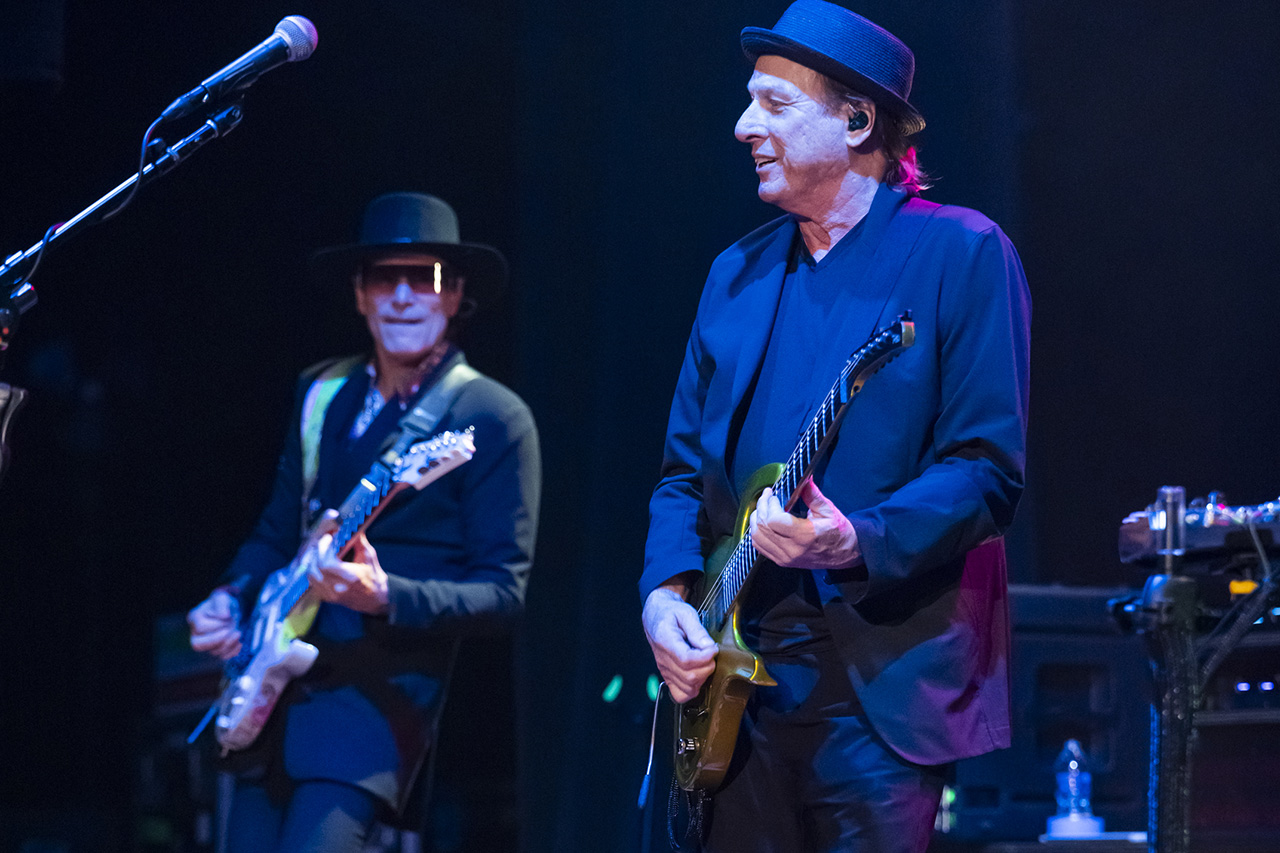
“He started navigating that technique when he was a young boy. He’s fiercely disciplined. He created a technique that enabled him to play in a way that is unique. It’s a slippery slope if it’s not in your wheelhouse to play that music on the guitar. I knew it would be a great challenge.”
How did you start dealing with it?
“I had two basic questions in my mind. The first one I asked Adrian was: ‘How does Robert feel about this?’ I didn’t want to get involved with anything that had drama in it. Adrian said, ‘This is something Robert and I discussed, and he’s all behind it. He even came up with the name.’”
“I said, ‘Let me take a listen to the music again and make sure I can get it under my hands.’ I listened to it and thought, ‘Yeah, I got this.’ Then I sat down to learn it and put my fingers to it – and that’s when I was introduced to the depth of Fripp’s intense technique.
“I could pretty much navigate the complexity of it, but the polymetric approaches that he and Adrian took in building this music were extraordinary. It was beautiful to me, and I wanted a piece of it.
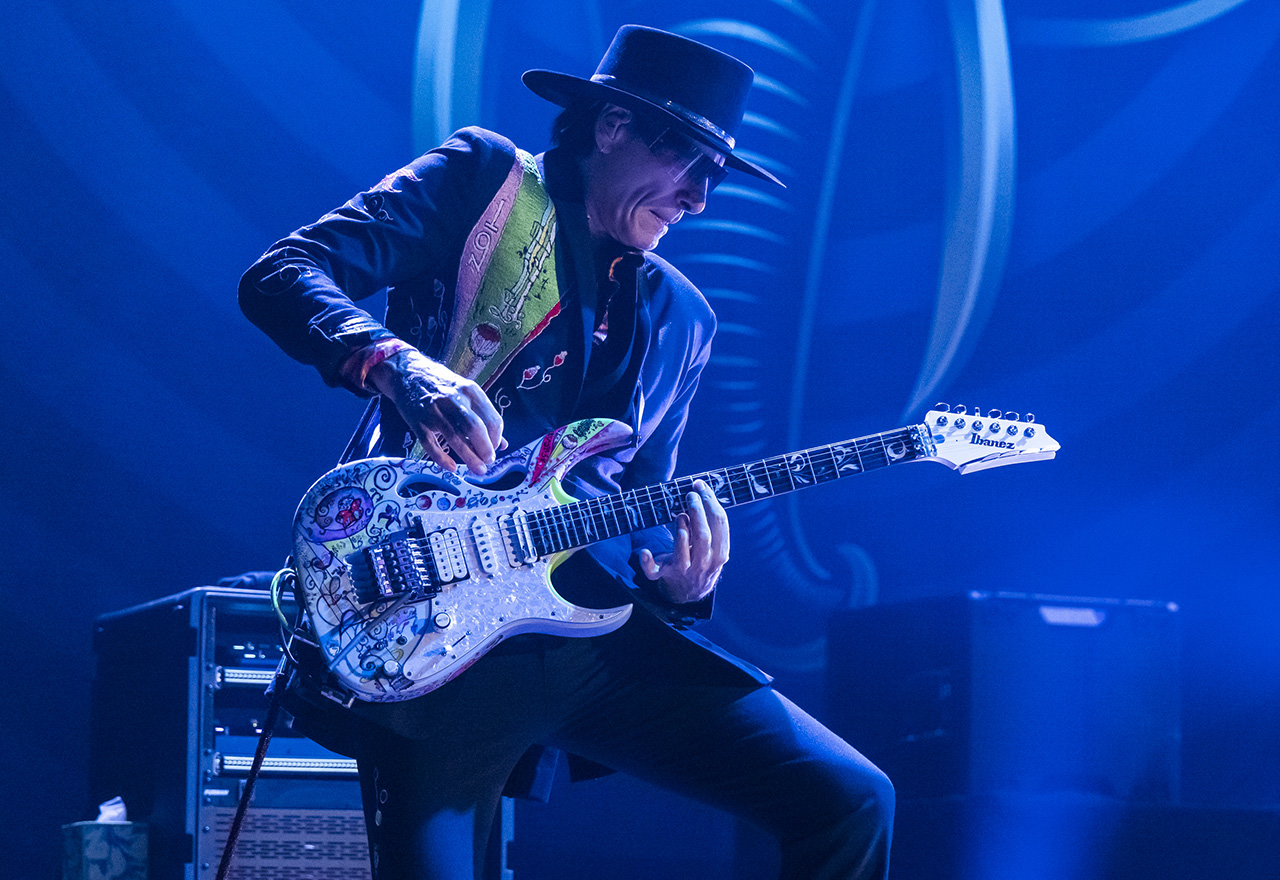
“A lot of the guitar parts were totally within my ability, but there were a couple that I just couldn’t navigate. One of them was Frame by Frame. It’s a simple riff; it’s only four notes, but it's this cross-picking riff that’s fast and relentless. He just doesn’t let up.
“I didn't have the confidence that I could do it perfectly every night. It was done by a 35-year-old Fripp at the top of his game. And 64-year-old Steve Vai doesn't really work that technique very well!”
Now that I know him, I see what Frank Zappa saw in Adrian. We both have a similar affinity for the absurd
How did you overcome that?
“I navigated it by double-picking it. I wasn’t happy with that. But two days after the first show I got an email from Robert, who’d watched a video. He said, ‘Why don’t you hammer Frame by Frame? Grab the initial notes and then improvise on it. Then go to the next chord and do that.’
“That was something I’d thought about doing initially, but it would take it far away from the original part. But when it came from Robert as a suggestion, I thought, ‘Yeah, that’s my wheelhouse.’ I did it that night at the show, and it worked beautifully. It’s unique to me – yet it was birthed by Robert and Adrian, you know?”
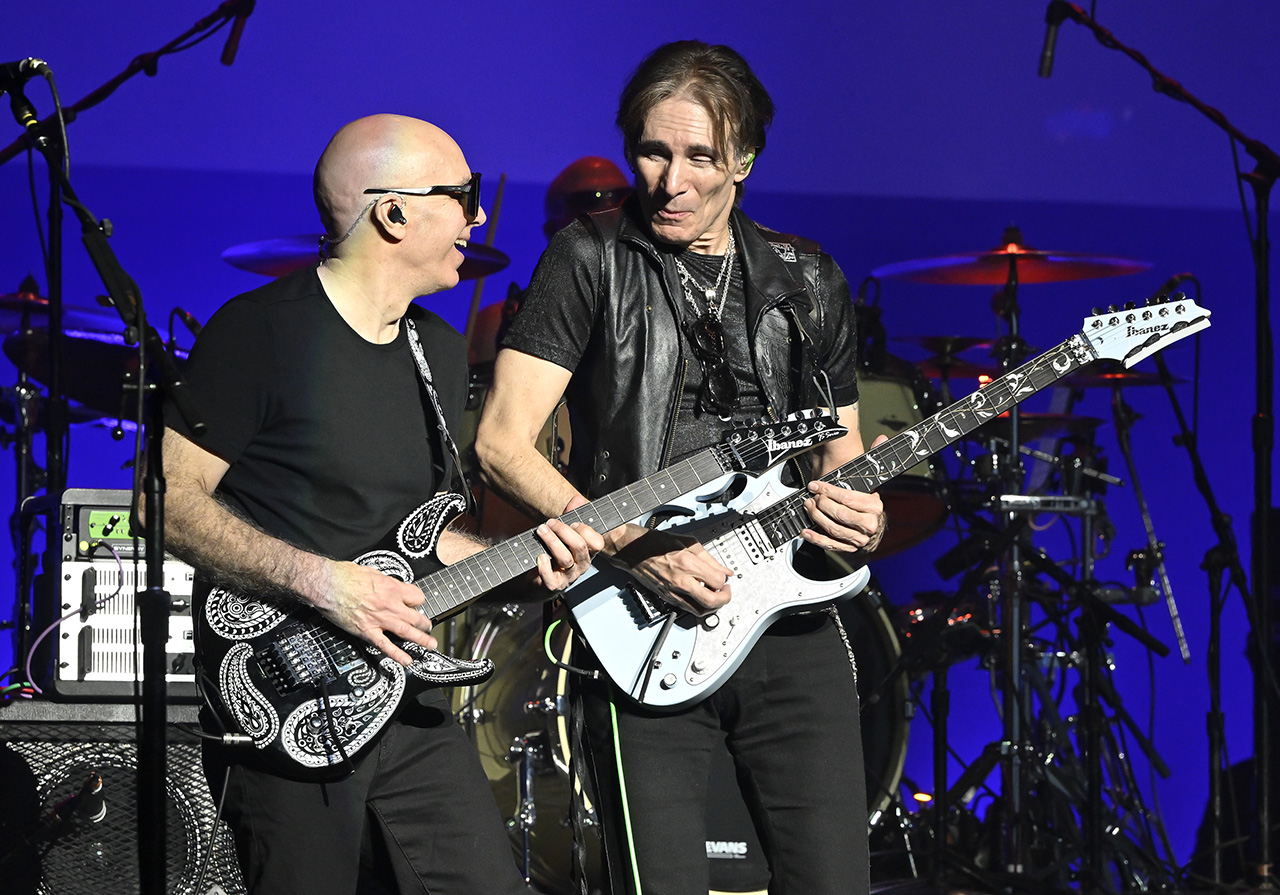
What was the most fulfilling aspect of tackling Fripp’s parts?
“I started while I was on tour with Joe. I’d be backstage learning these parts, and luckily for me there was a transcription book that had every note of these albums forensically transcribed. That was a lifesaver because Adrian and Robert used similar amps and tones, and it’s all this polymetric stuff.”
What did you discover about Adrian while playing alongside him?
“I discovered he’s a dimensional musician. He wears who he is on his strings without any excuses. This is a guy who worked for Frank Zappa. Frank said to him, ‘Whatever you do, don’t learn how to read music.’ Adrian’s approach is all creative –this guy is a miracle, really.
“Nobody I’ve ever heard has done what he’s done. He has a completely different approach to the guitar and a manifestation of sounds. He’s like a scientist. I watch him every night, and it’s so different from me. We really are two completely different players, but so much of our careers were joined at the hip once we got on tour and got to know each other.
“‘Unique’ is an overused word, but he’s a unique guitar player. Those melodies and lyrics are to die for; the songs he brough to the band, without a lot of those beautiful melodies and vocal lines, would be more like fascinating mathematical compositions.”

You’re something of a mad scientist yourself. Do you think you and Adrian both inherited that trait from working with Frank Zappa?
“Well, Frank utilized it. He was capable of recognizing certain qualities in a musician who he’d invite into the band. Anybody Frank would hire had something they could do that was appropriate for him, and extraordinary in some way. He’d pull that out of you. He’d give you a forum to display your potential.
“He handpicked Adrian, and he picked me because we had something that was useful to him. And now I know why he picked Adrian! I saw it when he was with Frank, but now that I know him, I see what Frank saw in Adrian. We both have a similar affinity for the absurd.”
It exceeded my expectations… They say life is about collecting experiences; this was a great one
What are your overarching thoughts on the BEAT experience?
“It exceeded my expectations. I always lay in bed the night before I leave for a tour and say to myself, ‘I wonder how this is going to go.’ Then, the tour happens, and I get to my bed the night after the last show, and I think, ‘Oh, that's how!’
“Tonight is our last show, and I can tell you that it’s one of my favorite tours I’ve ever done. It was just magnificent. I could not be more grateful to the band and the audience. They say life is about collecting experiences; boy, this was a great one.”
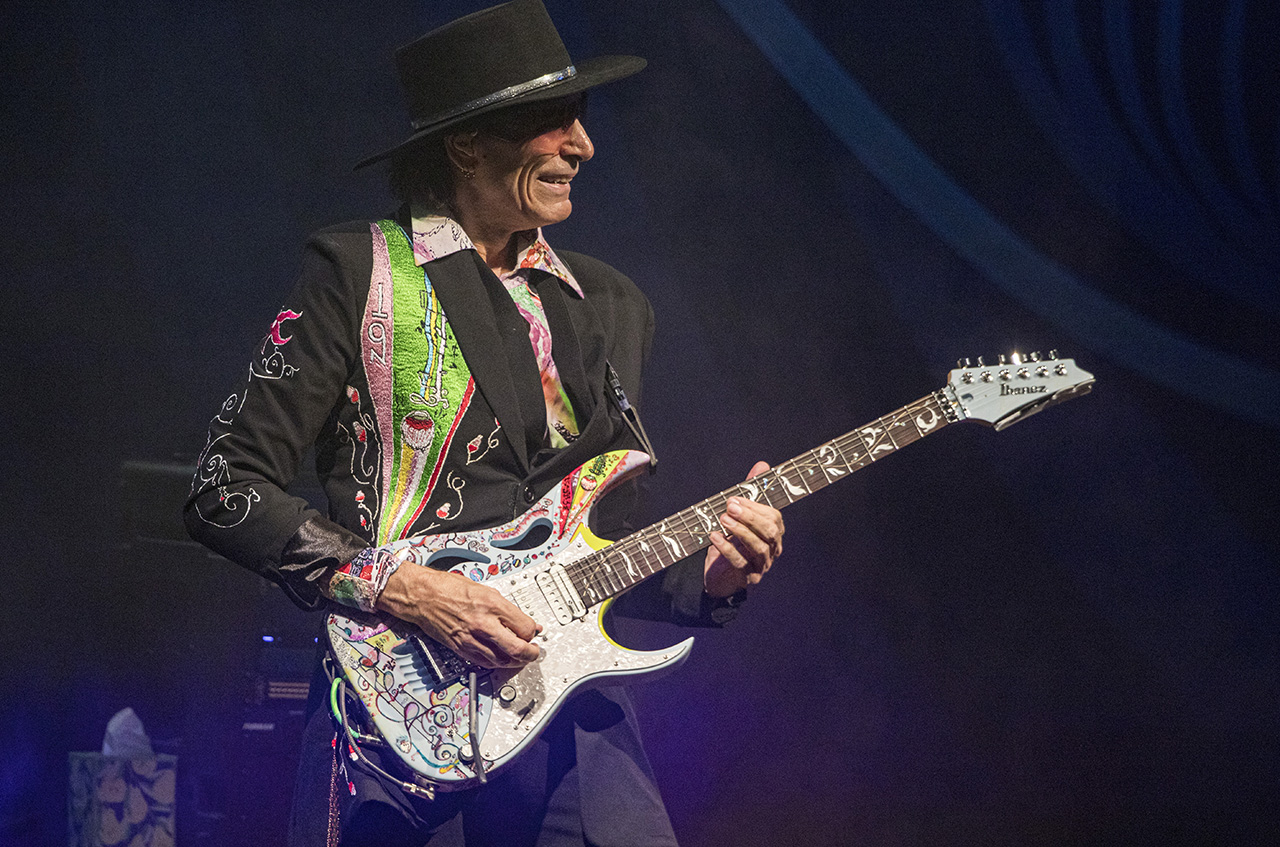
That’s saying something, considering you also toured with Joe Satriani in 2024, and you have big plans for 2025.
“I’ve been balancing this lifelong desire to make a record with Joe. We started talking about it quite a while ago; we’ve been talking about it our whole lives, but it just turned out that now is the right time, because we’re doing it.
“We started tracking before the G3 tour because we needed something going for the SatchVai tour. We recorded three tracks; and since then, Joe and I have been trading tracks, riffs and snippets of things.”
It wouldn’t make sense to start pulling guys from our bands. We’re looking for something kind of fresh and new
Is recording with Joe a very different experience than working on your solo albums?
“It's a whole different kind of environment. I can collaborate very well – I’ve done it a lot in the past . But when it comes to my music, I’m very precious; it’s like a secret to me. Having somebody to share ideas with, and bounce things back and forth, it’s new for me. And because it’s Joe, I’m working with the king of melodic phrasing. We're having a blast.”
You both have great bands. So how will you fill out the SatchVai lineup?
“Joe and I talk about the protocol – how the music’s going to be covered and who we need. It wouldn’t make sense to start pulling guys from our bands. We’re looking for something kind of fresh and new. There are people we’ve been talking with.”

Are they going to be newcomers or established veterans?
“Veterans – but we’re not ready to announce any of that just yet.”
Will your rig with Satch be entirely new?
“I’m building a whole new rig. It's a whole different brain muscle than BEAT, which is more guitar synth stuff. With Joe I probably won’t be doing any of that. Just the rig itself is a different feeling, so the rig will change.”
Recently, a Hungarian teen was caught on film shredding through For the Love of God. Did you manage to catch that?
“Yeah, I did!”
There’s old quotes of you talking about the rigors of putting that track together. Seeing such a young person ripping it up must have been a trip!
“I always feel that young people who come into the world today have more tools than older people who’ve been around. They come in with a different awareness; they open their eyes, look around at where things are at and take it from there. That’s how guitar has evolved.
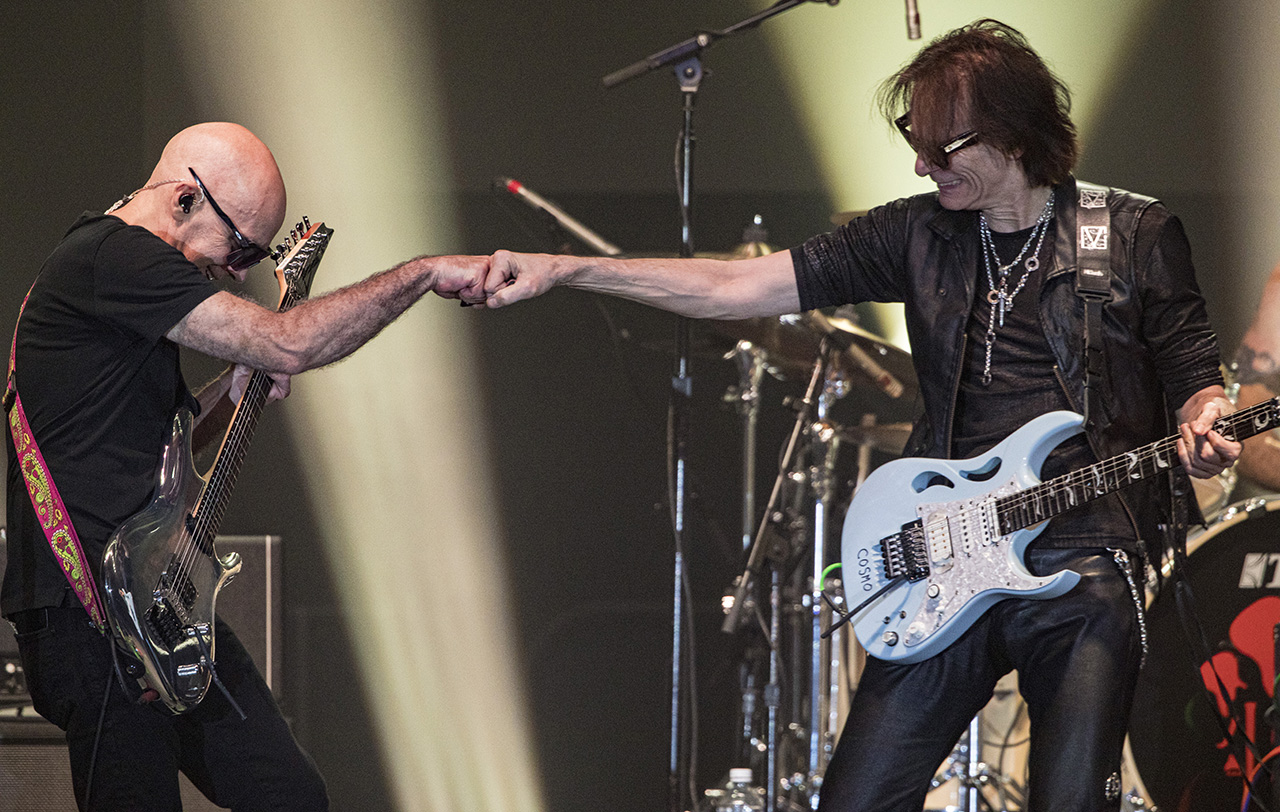
“I was listening to Jimmy Page, Brian May and Ritchie Blackmore; I opened my eyes and thought, ‘Okay, this is where it starts.’ That’s happened for a couple of generations now. I’ve seen the guitar develop in ways that are just stunning.
“People send me clips all the time of people covering my tracks, and it’s always charming. It’s so nice to see people putting in the time and dedication. And this young man was one of them; he did a great job, and it was just very touching. I feel honored by something like that.”
- The SatchVai Band’s summer 2025 UK and European tour tickets are on sale now.
Andrew Daly is an iced-coffee-addicted, oddball Telecaster-playing, alfredo pasta-loving journalist from Long Island, NY, who, in addition to being a contributing writer for Guitar World, scribes for Bass Player, Guitar Player, Guitarist, and MusicRadar. Andrew has interviewed favorites like Ace Frehley, Johnny Marr, Vito Bratta, Bruce Kulick, Joe Perry, Brad Whitford, Tom Morello, Rich Robinson, and Paul Stanley, while his all-time favorite (rhythm player), Keith Richards, continues to elude him.



![[from left] George Harrison with his Gretsch Country Gentleman, Norman Harris of Norman's Rare Guitars holds a gold-top Les Paul, John Fogerty with his legendary 1969 Rickenbacker](https://cdn.mos.cms.futurecdn.net/TuH3nuhn9etqjdn5sy4ntW.jpg)







